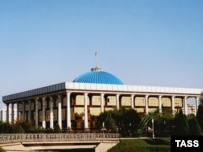The hearings, featuring not only parliament members but extraparliamentary politicians, historians and pundits, were part of “internal political consultations” promised by the Armenian and Turkish governments. The opposition Armenian Revolutionary Federation (Dashnaktsutyun) and Zharangutyun (Heritage) parties used them for reaffirming their strong rejection of the agreements envisaging the normalization of Turkish-Armenian relations.
Nalbandian sought to disprove their “artificial” claims that Yerevan has effectively accepted long-standing Turkish preconditions for the establishment of diplomatic relations between the two states and reopening of their border.
“Are there any preconditions? No and once again no,” he said. “Are we casting doubt on the fact of the Armenian genocide? Are we hampering international recognition of the Armenian genocide? No and once again no.
“Is there a connection between the finalized documents and the Nagorno-Karabakh negotiating process? None and once again no.”
Armenia — Armen Rustamian, a leader of the opposition Armenian Revolutionary Federation, speaks during parliamentary hearings.
Dashnaktsutyun and Zharangutyun leaders were unconvinced by these assurances. “Wittingly or unwittingly, we have accepted the Turkish preconditions and allowed an extremely serious deviation from our foreign policy course,” said Armen Rustamian, a Dashnaktsutyun leader who chairs the parliament’s foreign relations committee, which organized the hearings.
Rustamian also criticized the government for stressing the importance of open borders for Armenia’s long-term economic development. He drew parallels between that stance and the past conciliatory discourse of former President Levon Ter-Petrosian.
Tigran Torosian, a former parliament speaker who is now highly critical of Armenia’s current leadership, likewise claimed that it has made “unilateral concessions” during the more than yearlong dialogue with the Turks. “What is Turkey giving up in return for our concessions?” he said. “Opening the border, which is its international obligation? Turkey is simply doing what it was supposed to do in the first place.”
Predictably, the opposition critics vehemently objected to the planned creation of a Turkish-Armenian “sub-commission” of historians what will look into the 1915 mass killings of Armenians in the Ottoman Empire. “The creation of that sub-commission presupposes the erasing of all evidence that the genocide took place,” said Vahan Hovannisian, another Dashnaktsutyun leader. “It means that the evidence is not that weighty.”
Nalbandian countered that the panel will not seek to determine whether the Armenian massacres constituted a genocide and will only serve as a forum for Turkish-Armenian discussions on “numerous issues coming from the past.” “This sub-commission has no other mandate,” he said. “Nor does it have any time limits because we realize that this process can last very long. Maybe 10 years, maybe 20 years, maybe 50 years, or maybe longer.”
“The idea is that by talking, opening up to each other, our societies could reach some common denominators,” added the minister.
Eduard Sharmazanov, a parliament deputy from the ruling Republican Party of Armenia (HHK) also saw little cause for concern. “It is the party which has always falsified history that should be more worried,” said Sharmazanov. “It’s Turkey that has falsified history. And that sub-commission could serve as a ticking time bomb for Turkey.”
The HHK and its two junior coalition partners, which together control the vast majority of parliament seats, reaffirmed their full support for the agreements in a further sign that their ratification by the National Assembly is a forgone conclusion. The HHK’s parliamentary leader, Galust Sahakian, claimed that President Serzh Sarkisian and his political allies are undaunted by the opposition criticism.
The bitter debate on the issue, explained Sahakian, is only making the ruling coalition “more vigilant.” “The more blows we get, the more manly we become,” he said.
 Armenian President Serzh Sarkisian
Armenian President Serzh Sarkisian


 The Uzbek parliament building in Tashkent (file photo)
The Uzbek parliament building in Tashkent (file photo)



 Armenia — Foreign Minister Eduard Nalbandian meets with the leadership of the Armenian Assembly of America in New York.
Armenia — Foreign Minister Eduard Nalbandian meets with the leadership of the Armenian Assembly of America in New York.
 Armenia – Foreign Minister Eduard Nalbandian speaks at parliamentary hearings on Armenian-Turkish relations, Yerevan, 01Oct, 2009
Armenia – Foreign Minister Eduard Nalbandian speaks at parliamentary hearings on Armenian-Turkish relations, Yerevan, 01Oct, 2009